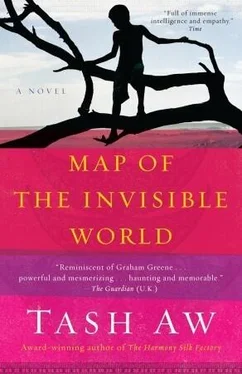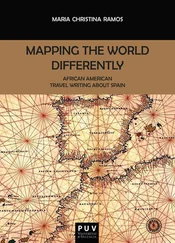He put his hands in his pockets and chuckled his farm-boy laugh again. They were standing beside a model of an offshore oil rig. The sea was a clear crystal blue and the waves washed calmly onto a white sandy beach; beyond the beach there was a silvery petroleum-processing plant.
“I know what you’re going to say,” Margaret continued. “‘We’re fighting a war out there! A war that will decide the future of the world! We cannot let Indonesia fall to communism’—right?” She dug him in the rib cage; she had intended merely to tickle him but misjudged her lunge and ended up catching him heavily between two ribs. He only flinched a little.
“It’s kind of silly, the things we do in the name of ideology,” he said, staring at the men in hard hats on the deck of the rig. Margaret saw the reflection of his face in the glass; his lips were parted as he smiled, but his eyes seemed to be narrowed in a frown.
“Seriously, Bill,” she said, continuing to watch his reflection. “Do you actually have any friends?”
“Sure, I know lots of people here.”
“No, I mean people who aren’t of use to you in your work, people you like … you know, real friends.”
“Look at that,” he said, touching his index finger to the glass. A turtle floated in the water, a single leatherback drifting calmly in the ocean. “He looks kinda happy, don’t you think?”
“Guess so. Lots of fish for him to eat — look.” She pointed at a shoal of mackerel suspended in the glassy ocean.
Bill put his hand on hers. It sat awkwardly, covering her thumb and index finger, but otherwise it felt smooth and broad. Their hands obscured the oil field and cast a shadow on the sea, as if a rainstorm was imminent; she could no longer see the fish in the sea, and the fishermen casting nets from their boats seemed suddenly in danger.
She looked at the freckles on his wrist and his sturdy, waterproof Timex.
“We’re not late for the speech, are we?” she said.
“Nope.” He moved his hand slightly, angling the watch toward him to check the time. “I have my car outside.”
A man walked briskly past them, heading for the stairs. “Hurry home, folks, the show’s about to begin.” He seemed barely old enough to have graduated from college — no older than thirty, in any case; his hair was Scandinavian blond, and his chinos were ironed with a sharp crease down the front.
“Thanks, Larry,” Bill said. “Sure you don’t want to come and listen to the speech with us? We have front-row seats.”
Larry frowned, his pale features twisted in confusion. “You gotta be crazy, Bill. No way — I’m planning to stay home and enjoy the president’s speech on the radio, like any sane human being. I’ll leave the live show to you old pros. Nice meeting you, ma’am.” He made a pinching motion in the space in front of his forehead, doffing an imaginary hat as he disappeared down the stairs.
“Who was that escapee from nursery school?” Margaret asked.
“Oh, Larry. He’s a friend.” Bill looked at Margaret and smiled. “I mean, he’s a colleague. He works at the embassy.”
“Enough said. I don’t think I need to know more.”
Bill put his hand lightly on her waist as they left the building. It was very hot and there did not seem to be any shade in the street.
As they approached the palace in his car it became more difficult to negotiate their way through the crowds. People were strolling in the middle of the roads, large groups of young men sauntering casually or skipping along with their arms over each other’s shoulders as if they were on a day out, a picnic at the seaside. Their red and white bandannas and painted faces were meant to make them look frightening, but Margaret found it difficult to take them seriously. They looked like children on their way to a tea party where they would play musical chairs and pin the tail on the donkey (it was so easy to imagine the bandanna as a blindfold). It was precisely because they wanted to look like Dayak warriors, thought Margaret, that she found them so ridiculous. She could not help giggling whenever she saw their snarling faux-fierce faces on the street — they looked frail and pathetic in their flip-flops and nylon shorts and faded T-shirts that said COME ALIVE! YOU’RE IN THE PEPSI GENERATION. There were groups of young women too, soberly dressed in slacks and blouses, carrying banners that proclaimed them to be revolutionary women of God or young women striving for the goodness of mankind. You could always tell the university students too — they were just a little neater, in spite of the effort some of them made to appear scruffy, to blend in with their brothers on the streets. Margaret scanned the crowd for any of her former students. She could say that with some confidence: former . There had not been classes for some weeks now, and she doubted she would ever teach again. A group of women went past, singing the president’s name in a childish monotone.
“What happened to your girlfriend, Bill?” Margaret said, looking out the window.
“What do you mean? I haven’t got a girlfriend.” The car had slowed to near-walking speed as Bill eased through the crowd.
“Come on, I mean that girl you were with a few days ago at the Hotel Java. Susie, or whatever her name was.”
“Oh, that one. It never really got off the ground. I wasn’t very serious — I never am with local girls. Hell, it’s difficult.” He cast a quick glance at Margaret, frowning slightly, then looked away again, concentrating on the thick soup of people ahead of them. “You must think I’m a real jerk, but it’s not easy, you know, doing my job, being with the embassy…. It’s hard just being in this city. Oh, shoot, you don’t know what I’m trying to say, do you? I can see it on your face. You’re okay here, you get along in this place. You adapt. I mean, really adapt. Me, I’m different, Margaret. I know what you think of me. I’m just this brute, this ugly Yankee who doesn’t get life abroad, who’s so American he’ll never understand foreigners—”
“I don’t think that.”
“The funny thing is that I’ve always felt this way with you. Even all those years ago in college, the very first time I met you, I thought, I’m never going to be like this girl. Even if I graduate summa cum laude and know how to translate Turgenev, I’ll still feel like a redneck next to her. I’ll never have what she has. And in Jakarta I feel like that even more. Look at you — you have no idea what I mean.”
The car came to a halt. The roads had been closed, and they were still some way from the palace. “I do know what you mean,” said Margaret.
At the roadblock there were about twenty soldiers manning a barricade of rusty old drums and barbed wire. Two Soviet tanks stood nearby and an armored carrier against which more soldiers leaned, smoking their cigarettes and watching the crowds pass. Bill rolled down the window, but none of the soldiers seemed interested enough to approach the car.
“We need to get through,” Bill called out. “We have an appointment at the palace. Let us pass immediately or else we will be late.” When Bill spoke Indonesian he sounded stilted, magisterial; Margaret had always thought it was a language that suited him, but she was not so sure now.
The soldiers laughed; Margaret was not sure what they were laughing at.
“This barricade is barricading our progress,” Bill continued in his efficient embassy voice. “We have the right to proceed immediately.”
One of the soldiers walked toward the car. He cradled his machine gun in his arms with such ease that it seemed to be part of his body. “American,” he said. Margaret could not tell if he was asking them or merely stating something he already knew.
Читать дальше
Конец ознакомительного отрывка
Купить книгу












